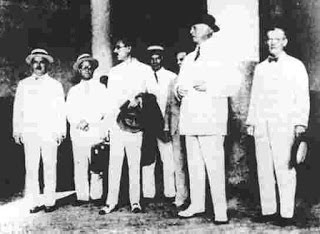Cuban Sanctions
President Bush decided in July to continue blocking civil suits by US persons against anyone dealing in property confiscated from Americans by Cuba during and after the
1959 revolution.
The so-called Helms-Burton Act, enacted in 1996, allows US persons to sue in the US courts for damages against anyone — a US person or otherwise — “trafficking” in property confiscated by Cuba on or after January 1, 1959. However, it also allows the President to suspend the provision at six-month intervals. President Clinton suspended the provision soon after it was enacted after Canada and various countries in Europe complained about the extra-territorial reach of the prohibition. The Bush administration decided in July to continue this policy.
However, other US sanctions remain in place against companies doing business in Cuba. These sanctions fall largely into three categories — the Cuban assets control regulations, the Helms-Burton Act and travel restrictions.
Cuban Assets Control Regulations
A US person is prohibited from engaging in any transaction (other than transactions of academic, informational or humanitarian nature) involving Cuba unless it receives a specific authorization from the Office of Foreign Assets Control within the US Treasury Department.
The Cuban assets control regulations prohibit US persons from engaging in any financial transaction on behalf of Cuba or a Cuban national or any transaction involving property in which Cuba or a Cuban national has had any interest at any time after July 8, 1963. A “transaction” broadly includes transfers of credit, payments between banks, dealings in foreign exchange, and exportation or withdrawal from the US of gold or silver coin or bullion, currency or securities. Furthermore, US persons may not deal in any security registered in the name of a Cuban national, whether by acquisition, transfer, disposition, endorsement or guaranty.
The regulations also prohibit exports and imports of Cuban goods. Specifically, US persons may not purchase, transport, import or otherwise deal in any merchandise of Cuban origin or transported from Cuba. Merchandise of Cuban origin includes merchandise made or derived in whole or in part of any article that is the growth, produce or manufacture of Cuba.
Finally, any transaction whose purpose or effect is evading or avoiding any of the prohibitions under these regulations is also prohibited.
US persons subject to these prohibitions include any US citizen, a US resident, any person physically within the US, and any legal entity organized under US laws. It also includes any foreign legal entity owned or controlled by a US person subject to these prohibitions.
If a US person violates any of these sanctions, criminal penalties of up to 10 years in prison and fines may be imposed. Corporate fines are up to $1 million and individual fines are up to $250,000. Civil penalties of up to $55,000 per violation may also be imposed.
A US person wishing to engage in a transaction prohibited by these regulations must obtain an authorization from OFAC. OFAC will issue an authorization after reviewing a written application only if it decides the transaction does not frustrate the basic goal of the sanctions, which is “[t]o isolate the Cuban government economically and deprive it of US dollars.”
 |
| Thomas L. Chadbourne (founder of Chadbourne & Parke LLP) in Cuba in 1930, heading the Cuban-American committee to face the world sugar crisis. Source: Instituto de Historia de Cuba |
Helms-Burton Act
Unlike the Cuban assets control regulations, the Helms-Burton Act applies to everyone, including foreign companies. Therefore, foreign companies, as well as US companies, that violate the prohibitions of the Helms-Burton Act will be subject in theory to its penalties.
The Helms-Burton Act prohibits anyone from “trafficking” in “confiscated property.” “Trafficking” means any kind of dealing — direct or indirect — to derive a benefit of any sort (for example, possession, use, profit, lease or investment). “Confiscated property” refers to property seized by the Cuban government on or after January 1, 1959 without adequate compensation.
The Helms-Burton Act provides two penalties for anyone trafficking in a confiscated property.
First, the US person who has a claim to the confiscated property may sue the person trafficking in that property for money damages in the US courts. The recoverable amount of the damages is the larger of the settlement amount certified by the Foreign Claims Settlement Commission plus interest or the current fair market value of the property, plus costs and reasonable attorney fees.
However, the enforcement of this provision was continually suspended by the former President Clinton for the last five years. President Bush has also suspended the enforcement until at least February 1, 2002.
Second, the US will deny visas to any person who trafficks in confiscated property. If an entity was involved in trafficking of a confiscated property, its corporate officers, principals, and controlling shareholders will be denied visas. The denial of visas extends to such persons’ spouses, minor children and agents as well.
Travel Restrictions
US law broadly permits travels to Cuba by US and foreign government officials, journalists, academic researchers, humanitarian aid providers, professionals attending international conferences and athletes participating in athletic competitions. Otherwise, US persons wishing to travel to Cuba must obtain a specific authorization from OFAC.
Implications
Under the Cuban assets control regulations, a US power company may not build a power plant in Cuba to generate and sell electricity to the Cuban national utility absent a specific authorization from OFAC. Such a project would involve transacting in property (i.e., contracts and services) in which Cuba or a Cuban national has an interest — a prohibited transaction.
A US power company taking a minority (e.g., limited partner) position in a partnership with a non-US company to do a power project in Cuba may also violate US sanctions. Under this structure, a US person may still be transacting in property in which a Cuban national has an interest — the partnership. This risk exists because the foreign partnership itself may be a Cuban national. A Cuban national includes “any person acting…directly or indirectly for the benefit” of Cuba or a Cuban national. OFAC declines to describe circumstances in which a foreign entity becomes a Cuban national by acting “for the benefit” of Cuba. However, it insists the term “Cuban national” will be read as broadly as necessary to achieve the goal of these sanctions — economic isolation of Cuba.
OFAC elaborates in its release with the following example: “[P]ersons subject to US jurisdiction (including US overseas subsidiaries) may not…sign a contract with a UK firm if thecontract term includes Cuba-related provisions (even if those provisions are contingent upon the lifting of the embargo); and may not provide accounting, marketing, sales, or insurance services to a Cuban company or to a foreign company with respect to the foreign company’s Cuba-related business.”
Finally, both forms of doing a power project in Cuba expose the US company, as well as the non-US partner, to the risk the project would traffick in confiscated property and violate the prohibition of the Helms-Burton Act.
----
Additional Chadbourne coverage of Cuban Sanctions:
Media Mention | New York Times Interviews Julissa Reynoso on Impact of Changing of US-Cuba Relations
Client Alert | US-Cuba Reset?
Client Alert | Doing Business in Cuba: New Guidance on Embargo Rules


